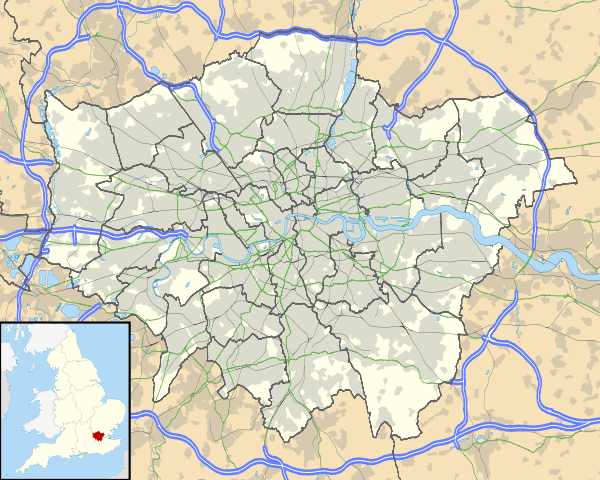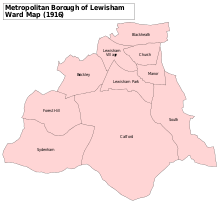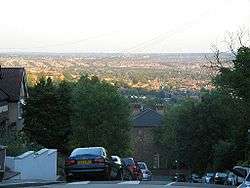Forest Hill, London
| Forest Hill | |
.jpg) Forest Hill library |
|
 Forest Hill |
|
| Population | 14,854 (2011 Census. Ward)[1] |
|---|---|
| OS grid reference | TQ354736 |
| London borough | Lewisham |
| Ceremonial county | Greater London |
| Region | London |
| Country | England |
| Sovereign state | United Kingdom |
| Post town | LONDON |
| Postcode district | SE23 |
| Dialling code | 020 |
| Police | Metropolitan |
| Fire | London |
| Ambulance | London |
| EU Parliament | London |
| UK Parliament | Lewisham West and Penge |
| London Assembly | Greenwich and Lewisham |
Coordinates: 51°26′45″N 0°03′11″W / 51.4457°N 0.053°W
Forest Hill is a suburb and ward of south east London, England, located in the London Borough of Lewisham.
History

Like much of London, Forest Hill was only sparsely populated until the mid-19th century. The name Forest Hill, originally simply "The Forest",[2] referred to the woodland which once covered the area[3] and which was a relict part of the Great North Wood.
A canal, the Croydon Canal, was constructed through the area in 1769 but the large number of locks (28) meant it was not a commercial success, and it was bought by the London & Croydon Railway Company who constructed their railway along the same route, opening it in 1839. The ponds in the Dacres Wood Nature Reserve[4] (Dacres Road) and the retaining wall of the footpath opposite the station outside the pub are about the only physical evidence of the canal which still exist.
When the Crystal Palace was moved from Hyde Park to Sydenham, large homes were built on the western end of Forest Hill.
In 1884, what would become London's oldest swimming pool was constructed on Dartmouth Road.
The tea merchant Frederick Horniman built a museum to house his impressive collection of natural history artifacts. He donated the building and its gardens to the public in 1901 and this became the Horniman Museum.
As its population grew, two large secondary schools were built in the area – Forest Hill Boys and Sydenham Girls on the brink of Forest Hill.



Amenities and entertainment
Forest Hill is home to the celebrated Horniman Museum. Despite a leaning toward anthropological and cultural collections, the museum is also home to a newly opened (July 2006) aquarium and one of the most varied collections of taxidermy in the northern hemisphere. It also houses one of the finest collection of musical instruments in the British Isles. Contained within its accompanying gardens is an animal enclosure, flower gardens, and a Grade II listed early 20th century conservatory. Views from the gardens stretch out over central and north London.
Following a successful and widely supported campaign from local group 'Save The Face Of Forest Hill', Louise House was designated a Grade II listed building by English Heritage,[5] and this will have to be allowed for in any plans for redevelopment. Mayor of Lewisham Steve Bullock continues to support the project.
Forest Hill Library was built in 1901 to an Arts and Crafts design by local architect Alexander Hennell.[6] It is one of over 500 Grade II listed buildings in Lewisham Borough.[7][8] It was refurbished in 2008.[9]
There are two nature reserves in Forest Hill, the Dacres Wood Nature Reserve[10] and the Devonshire Road Nature Reserve. Both nature reserves have regular open days. Dacres Wood Nature Reserve is open on the last Saturday of each month and Devonshire Road Nature Reserve is open on the last Sunday of the month.
Architecture
With a range of architectural styles spanning the late 19th and 20th centuries, Forest Hill was described by Sir Norman Foster as "a delightful pocket of South London". Of particular note are the Capitol Cinema (now a JD Wetherspoon pub), the Horniman Museum, and classic art deco mansion blocks Forest Croft and Taymount Grange.
Transport
Forest Hill railway station is located on the South Circular Road (A205), and is served by frequent London Overground and Southern trains to London Bridge, London Victoria, Croydon, Caterham, Dalston Junction and Highbury & Islington. Forest Hill is also served by a number of bus routes: 122, 176, 185, 197, 356, 363 and P4.
Notable residents
(in surname alphabetical order)
- Fisayo Akinade, actor, lives in Forest Hill.
- Home decor personality Linda Barker
- Dame Doris Beale, Matron-in-Chief of Queen Alexandra's Royal Naval Nursing Service for three years during the Second World War was born in Forest Hill on 9 August 1889.
- Dietrich Bonhoeffer (1906–1945), the German Protestant theologian and Christian martyr killed by the Nazis, briefly lived and preached in Forest Hill.
- Raymond Chandler, mystery and thriller writer, author of The Long Goodbye and The Big Sleep. Born in the USA, but educated at Dulwich College. Probably lived with his mother at 148 (now 138) Devonshire Road, Forest Hill from 1909 until he returned to America in 1912.
- Andy Coulson, editor, News of the World, 2003–07; Director of Communications, Conservative Party, 2007–11.[11]
- Ernest Dowson, poet
- Desmond Dekker lived in Devonshire Road, more towards Honor Oak.
- Don Letts, and Peter Perrett, of The Only Ones, in its 1970s musical heyday.
- Irish-born television, film and stage actor Michael Gambon, famous for portrayal of Albus Dumbledore in the Harry Potter movie franchise lived at Forest Croft in Forest Hill in the early to mid-1960s.
- Henry Charles Fehr (1867–1940), sculptor, was born in Forest Hill
- Denis Gifford, historian of film, comics, radio and television, was born in Forest Hill.
- Sir Isaac Hayward, politician
- Vince Hilaire, one of the first black players to establish himself in English football was born in Forest Hill on 10 October 1959 and went on to have a distinguished career with local club Crystal Palace.
- Tea merchant Frederick John Horniman (1835–1906) lived in Forest Hill. A keen traveller, he accumulated a large collection of items relating to local cultures and natural history. This became so large that he built a special museum for it, donated to the public in 1901.
- British film actor Leslie Howard (1893–1943) was born in Forest Hill on 3 April 1893
- Craig Fairbrass, actor, lives in Forest Hill
- David Jones, painter & poet
- Hollywood actor Boris Karloff was a resident of Forest Hill Road, Honor Oak.
- Tom Keating the famous forger lived in Forest Hill.
- Singer Millie lived in Forest Hill at the time of her major hit My Boy Lollipop
- William Page (1861–1934), historian and editor, lived here 1886–96
- Mica Paris, singer/songwriter
- John Parris of Parris Cues world-renowned cue maker.
- Henry Price CBE was a Conservative politician who represented Lewisham West between 1950 – 1964. He founded the "Middle Class Alliance" and in 1954, London County Council sought a compulsory purchase order for his home in Forest Hill to build council housing.
- Luke Pritchard, lead singer of The Kooks, was born in Forest Hill
- Aaron Renfree dancer and former singer
- Iwan Rheon, singer-songwriter and actor, formerly of the E4 series Misfits.
- Arthur Rhys Davids, World War I ace fighter pilot was born in Forest Hill
- Musician Francis Rossi, lead singer and guitarist of Status Quo, was born in Forest Hill on 29 May 1949
- Actor Timothy Spall was a resident of Honor Oak.
- Gavin Stamp, architectural critic
- Doris Stokes, medium
- broadcaster, journalist and cricketer E.W.Swanton was born in Forest Hill on 11 February 1907
- Jackie Trent the singer/songwriter lived in Forest Hill when she first had success in the 1960s
There is no evidence to support the claim of a private plaque that Dorothy Jordan, mistress of the Duke of Clarence, later William IV, lived in Forest Hill
Nearest places
 |
Dulwich | Honor Oak | Crofton Park |  |
| Dulwich | |
Catford | ||
| ||||
| | ||||
| Sydenham Hill, Crystal Palace | Sydenham | Perry Vale, Lower Sydenham |
Primary schools
- Kilmorie School
- Dalmain School
- Perrymount School
- Horniman School
- Fairlawn School
- Eliot Bank School
- Rathfern School
- Christ church CE Primary school
Secondary schools
References
- ↑ "Lambeth Ward population 2011". Neighbourhood Statistics. Office for National Statistics. Retrieved 13 October 2016.
- ↑ Hibbert, C. The London Encyclopedia, Macmillan, p. 304
- ↑ Field, J. Place names of Greater London, Batsford, 1980, p.49
- ↑ http://www.dacreswood.org.uk
- ↑ "Lewisham Council: News". www.lewisham.gov.uk. Retrieved 20 July 2014.
- ↑ "Forest Hill, London SE23 – Forest Hill Library". www.foresthill.org.uk. Retrieved 30 December 2009.
- ↑ Option Study lewisham.gov.uk
- ↑ "Lewisham Council – Statutory register – listed buildings". www.lewisham.gov.uk. Retrieved 30 December 2009.
- ↑ "Lewisham Council – Forest Hill library project". www.lewisham.gov.uk. Retrieved 30 December 2009.
- ↑ http://www.dacreswood.org.uk
- ↑ Hughes, Mark (8 July 2011). "News of the World to close: Andy Coulson's house searched after arrest". The Daily Telegraph. London.
External links
| Wikimedia Commons has media related to Forest Hill, London. |
